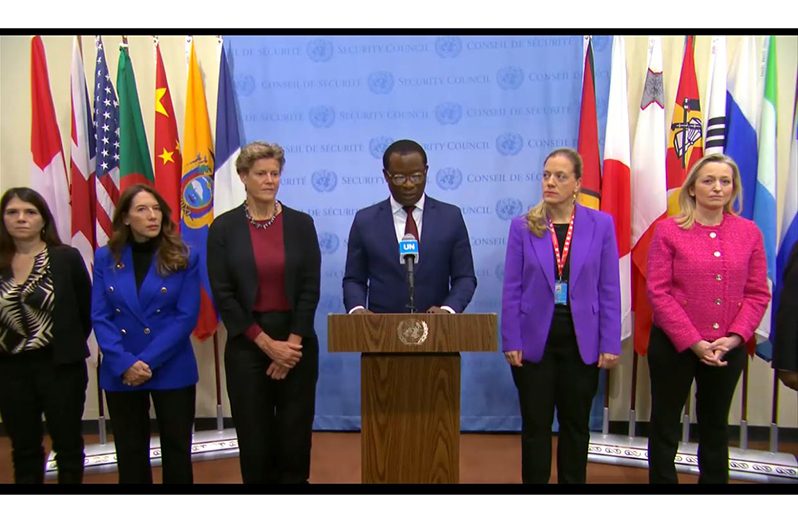IN a stirring call to global leaders, Guyana has championed the dire need for a unified approach to the intertwined challenges of climate change, food insecurity, and international conflict, setting the stage for a critical debate on global security.
This is according to Foreign Minister Hugh Todd, who spoke to the media before heading into the United Nations Security Council (UNSC) high-level open debate on “the impact of climate change and food insecurity on the maintenance of international peace and security,” which was chaired by President Dr Irfaan Ali in New York.
Guyana currently holds the presidency of the UNSC for the month of February.
Minister Todd was accompanied by UNSC members who are part of the Joint Pledges concerning Climate, Peace, and Security, emphasising the pressing necessity for a comprehensive approach to tackle these interconnected challenges.
“We are concerned that the increasing occurrences of extreme climate events are severely impacting access to vital resources, such as water and agricultural lands, and are battling inter-communal conflicts, especially in the most vulnerable regions of the world,” Todd stated, pointing to the pressing need for strategic action to combat these issues.
He reflected on the growing consensus on the importance of addressing climate change, food insecurity, and conflict as interconnected phenomena that pose significant threats to global stability.
Minister Todd highlighted the compelling evidence of the interrelationship between climate change, food insecurity, and conflict, which directly and indirectly impact international order.
“The science is compelling, and we have a strong view that this issue requires a systematic and strategic approach by the council,” he asserted, calling for comprehensive risk assessments and data-driven strategies to build resilience.
With a focus on the most vulnerable communities, Todd stressed that minor food-insecure, low-income, fragile, and conflict-affected countries and communities are at the highest risk.
The adverse effects of climate change, such as unpredictable rainfall patterns, severe droughts, floods, sea-level rise, and changing agricultural patterns, were underscored as key factors driving conflict and violence.
In his call to action, Todd urged the Security Council and the wider multilateral system to adopt a long-term strategy that recognises the adverse effects of climate change on stability, as noted in resolutions on peacekeeping operations and political missions.
“We know that the Security Council has recognised the adverse effects of climate change on stability… However, the council must endeavour to adopt a long-term strategy based on comprehensive risk assessments, utilising data and analytics to build resilience,” he said.
The minister concluded with a commitment from Guyana and its allies to advance a systematic, inclusive, and evidence-based approach to tackling the nexus of climate change, peace, and security.
This, he said, underscores the critical need for international cooperation and strategic planning to address one of the most pressing challenges of our time.
Guyana has been elected as a non-permanent member of the United Nations Security Council for the 2024–2025 term. The country’s candidacy was uncontested, and it is the sole candidate for the seat of the Latin America and Caribbean region.
The country’s participation in the Security Council will allow it to engage in discussions and decision-making on various global security issues, including, but not limited to, conflicts, peacekeeping operations, and the impact of climate change on security.
The Security Council has been exploring how climate change affects the capacity of United Nations peacekeeping and special political missions to implement their mandates, as well as how climate action can provide entry points for conflict prevention, resolution, and peacebuilding.
The Council has also been urged to support the development of a collaborative and responsive approach to climate change, peace, and security and to target and tailor climate action to complement its responsibility to maintain international peace and security.
In 2023, the AU Peace and Security Council adopted a common position on climate change and peace and security in Africa, offering a possible model for the UN to do something similar.
African member states have played a leading role in integrating climate change into peace work, and there is scope to build on this and bring in new evidence from the African continent.



.jpg)








